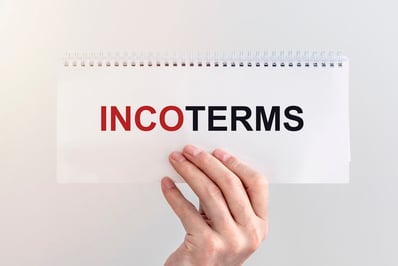- Home
- About
- Services
- Tools & Resources
- Client Info
- Request Info
- Carrier Tools
- Contact Us
- Get a Quote
- Français
The Incoterms or International Commercial Terms are a series of trading terms and conditions designed to assist companies when goods are sold and transported. When both a buyer and seller agree to an Incoterm, it then allows both the buyer and seller to identify clearly where lies the responsibility of each party.
Incoterms help define when the risk of loss or damage is transferred from the seller to the buyer. Under some terms this is when the seller has fulfilled the delivery obligation according to the applicable term. Under certain terms, the risk of loss or damage transfers at different points throughout the supply chain.

In today’s volatile market conditions, choosing the wrong incoterm could be a large detriment to an importers’ scheduling, timelines, and bottom line costs.
For example, a recent port strike in Montreal underlined the real-world consequences of choosing the correct Incoterm. Carriers needed to get cargo from Halifax to Montreal. But, who was responsible for that expense? That depended on which Incoterm was agreed upon by the exporter and importer, which outlined the division of obligations, costs, and in this case, risks.
The importer was responsible in the case of EXW (ExWorks), FCA (Free Carrier), CIF (Cost, Insurance, and Freight), CPT (Carriage Paid To), and CIP (Carriage and Insurance Paid To).
But, for DAP (Delivered At Place), DPU (Delivered At Place Unloaded), and DDP (Delivered Duty Paid) contract, the exporter must bear the costs.
The incoterm defines at which point during the transportation the responsibility switches from seller to buyer. The terms of sale, or Incoterm, should be discussed and negotiated between buyer and seller before any agreement or contract is firm between the two parties.
It is important that as a buyer or seller, any importer or exporter must have knowledge of what the incoterms are, in order to negotiate the best Incoterm that suits both the buyer and seller, and that both parties agree to it.
Importers as Buyers must keep in mind that they should look to negotiate an Incoterm that is in their best interests. They should consider choosing terms that provide them with greater control on their product visibility during transport.
One common mistake importers as buyers make is to agree to the sellers proposed Incoterms, which may not always be in their favor. When this happens, the sellers control the terms of sale, and the Importer or buyer can lose control of their assets. It is incredibly important for importers to be up savvy with incoterms, their meanings, and limitations.
It would be strongly suggested that as an importer, you obtain information or education on the Incoterms.
Read more here:
Download the International Chamber of Commerce's Incoterms 2020 mobile app for up-to-date resources and insight.
Cole's freight forwarding department is well-versed in Incoterms rules. We're ready to help you understand the pros and cons of each—and how the rules may work in your favor. Contact our freight department today!
Learn more about our Freight Forwarding Services.
Incoterms. It's what we do.